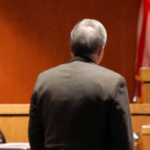Probation is a Sentencing Alternative to Jail Time
Everyone has heard the term “probation,” but does everyone know what it means? Is it the same for everyone?

An alternative to a jail sentence in felony and misdemeanor cases.
Probation is court supervision of anyone convicted of a misdemeanor or felony. A conviction can be by plea or after a trial. Misdemeanors can be state law misdemeanors, ordinance violations, or traffic misdemeanors. Under court supervision, the sentencing judge controls some areas of the convicted person’s life and what they can, can’t, and must do for some time. Probation is not considered a “right,” A person found guilty of a crime cannot choose whether the judge will order probation or incarceration. For obvious reasons, people convicted of a crime hope their lawyer is influential enough to convince the judge to order a term of probation because the alternative is usually jail.
Of course, some people find the idea of being told what to do repugnant, and virtually all lawyers have been asked by a client, “If I take the plea being offered, will I have to be on probation?” Sometimes, the sentence can be fines and costs only, without court supervision; however, this is exceptionally rare.
Generally, courts use a term of probation to help defendants deal with life problems, like substance abuse issues or mental health concerns, or provide rehabilitation. In other cases, court supervision is used as a punishment but, at the same time, as an alternative to jail. These clients fail to appreciate that the court wants to ensure they will not re-offend and that the public will be protected. Therefore, the court will prohibit alcohol and unprescribed drugs in virtually all cases, even those having nothing to do with drugs or alcohol.
What are the Typical Terms of Probation?
In most cases, judges will not allow probationers to use drugs or alcohol. Over 60% of all criminal cases involve alcohol or drugs in some way. Failing drug or alcohol tests or failing to submit to them as ordered can result in a jail term and perhaps an extended probationary period.
Probationers generally pay for court supervision. So-called supervision costs are the costs of testing, reporting, meeting with a supervising agent, and perhaps taking certain classes. Sometimes a court will allow “nonreporting probation.” Typically, cases with nonreporting supervision are relatively minor, with no apparent connection to alcohol or drugs.

Depending on the case, terms sometimes include:
- community service,
- fines and costs,
- organized court workforce,
- writing essays,
- not going into bars,
- mental health therapy,
- court-ordered classes,
- tether (alcohol or GPS),
- no contact with victims,
- no assaultive or aggressive behavior,
- truthful reporting,
- no driving,
- staying in the state of Michigan unless permission is granted to leave,
- no new criminal charges,
- complete a high school degree,
- and obtain or maintain employment.
How Long Does a Term of Court Supervision Last?
The length of a probationary term varies based on the crime, the defendant’s history, and the abilities of the defense attorney. Usually, felony probation is up to five years. It is often shorter but depends on the circumstances and whether the judge can order a shorter term. A top-rated, reputable defense attorney can sometimes influence a judge to impose a much shorter term. Sentencing allocution is an art, and only the most exceptional lawyers routinely achieve exceptional outcomes for clients. Success at sentencing requires a thorough understanding of the defendant, the judge, and the prosecutor. When the judge asks, “why should I give your client a break on the length of probation?” your attorney better have a great answer. The best lawyers always do.
With misdemeanor convictions, the term of court supervision is routinely one year, although it may be as high as two years. An astute lawyer will know the arguments that can be made to reduce that time to six months or even less, depending on the client’s circumstances and the case. No lawyer can guarantee any specific sentence, although a top lawyer gives the client the best chance of getting lenient terms of probation.

How to get off probation early?
Getting an early discharge from probation can be a complex process that depends on various factors, including the terms of your supervision, the length of your sentence, and your behavior while on probation. However, here are some general steps that can increase your chances of obtaining an early discharge:
- Review the terms of your probation: Before pursuing an early discharge, ensure you understand the terms of your court supervision and what you need to do to fulfill them. This may include completing community service hours, attending counseling or therapy sessions, paying fines or restitution, and staying out of trouble.
- Consult with your probation officer: Your probation officer can provide valuable guidance on the requirements for early discharge and the steps you need to take to qualify. They can also assess your progress and behavior while on probation and provide a recommendation to the court.
- Complete all requirements early: One of the most critical factors in obtaining early discharge is fulfilling all your probation requirements early. This demonstrates your commitment to rehabilitation and can give the court confidence in your ability to complete the term of supervision successfully.
- File a motion with the court: Once you have completed all the requirements of your probation and, if possible, the support of your probation officer, you can file a motion with the court requesting early probation discharge. The motion should provide evidence of your progress and rehabilitation and any extenuating circumstances that may justify early discharge.
- Attend the hearing: If the court grants your motion, you may be required to attend a hearing to formalize the discharge. Attend the hearing and follow the court’s instructions to ensure a successful discharge.
It is important to note that the process for obtaining an early discharge from probation can vary widely depending on the jurisdiction and the specific circumstances of your case. Consulting with an experienced criminal defense attorney can help you navigate the process and increase your chances of a successful outcome.
What You Need to Know About Probation Violation
Probation violation occurs when an individual fails to comply with the terms and conditions of their probation. If you have been placed on probation, it is vital to understand the consequences of violating the terms of your probation.
- Types of Probation Violations: There are various types of violations, including failing to report to your supervising agent or officer, failing to complete community service or rehabilitation programs, failing drug tests, and committing new offenses while on probation.
- Consequences of Probation Violation: If you violate your probation, your probation officer can file a report with the court. This can result in a revocation, which means that you may be sent to jail or prison to serve the remainder of your sentence. In some cases, the court may reinstate your probation but impose additional conditions, such as community service or a longer period of court supervision.
- Defenses to Probation Violation: If you have been accused of probation violation, there may be probation violation defenses available to you. For example, if you missed a meeting with your probation officer because of a medical emergency, you may be able to show that you had a valid excuse for your absence.

The Best Criminal Defense Attorneys in Michigan for a Probationary Sentence
The dedicated, experienced, and zealous defense attorneys at LEWIS & DICKSTEIN, P.L.L.C. have successfully represented thousands of clients on felony and misdemeanor charges in Oakland, Macomb, Wayne, Washtenaw, and Livingston Counties, and throughout Southeastern Michigan. We have a well-earned reputation for providing the highest quality defense and aggressive representation, while showing empathy and care for each client. Call us for a free consultation, and we will find a way to help you.
Call us today at (248) 263-6800 for a free consultation or complete an online Request for Assistance Form. We will contact you promptly and find a way to help you.











